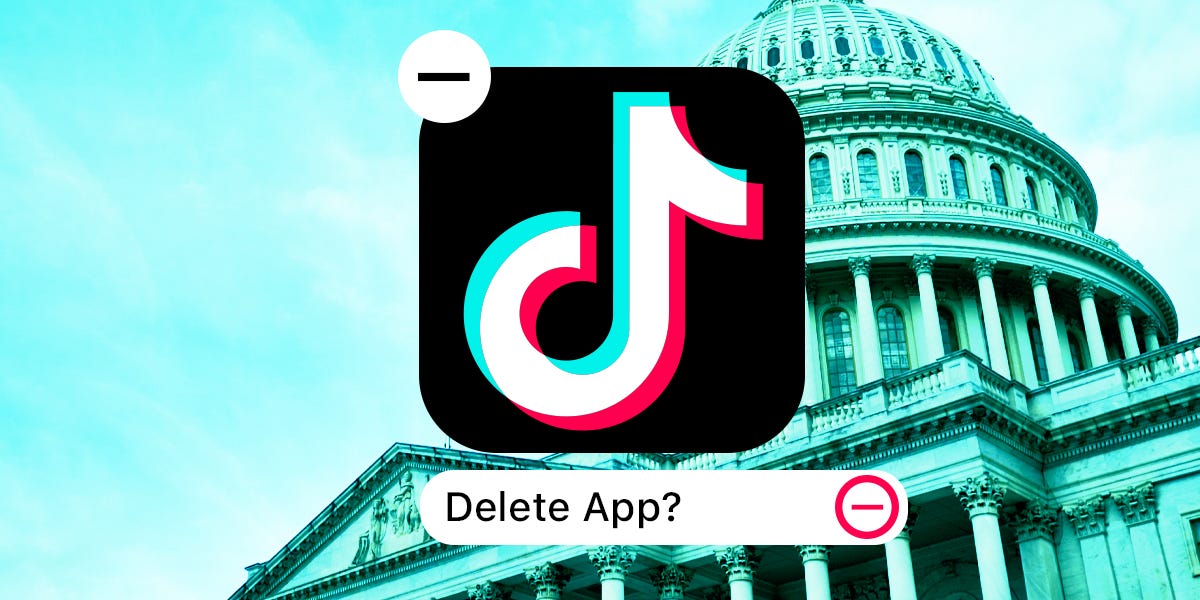- A bill aimed at banning TikTok in the US could be signed into law as early as this week.
- But that doesn’t mean TikTok will be banned in the US anytime soon.
- At the very earliest, a ban wouldn’t kick in until 2025. It could take a lot longer than that, though.
The US House of Representatives passed a so-called TikTok ban bill on Saturday. Does that mean TikTok is getting closer to getting banned in the US?
Absolutely.
Will TikTok get banned in the US anytime soon?
No.
While the conventional wisdom is that the US Senate will likely approve the bill this week, and President Joe Biden will sign it into law shortly after, TikTok won’t go anywhere immediately.
At the very earliest, the ban wouldn’t go into effect until nine months after Biden signs the bill — meaning 2025. But even that is unlikely to happen.
Let’s explain.
I remember reading about a maybe-TikTok-ban-bill last month. Has something changed?
A little bit.
In March, the House passed a bill requiring ByteDance, TikTok’s China-based owner, to sell the US operations of TikTok to someone who isn’t based in a “foreign adversary;” if not, the app would effectively be banned in the US.
Since then, the bill’s sponsors made two changes: The first and most important one was bundling the bill along with measures calling for US aid to Ukraine and Israel. While forcing TikTok to sell or leave has mixed political support, the aid packages are a priority for much of Congress. Combining all three things means the TikTok bill will likely be approved as part of the package deal.
The language around the proposed ban has also been tweaked. Instead of requiring ByteDance to sell off its US operations in six months, the company now has nine months to get a deal done. And the bill also gives a US president the power to extend that new deadline by another three months if there’s a deal in the works.
So you’re saying ByteDance really has a year to sell TikTok to a different owner?
Yes. But also, no.
If Biden signs the bill, that nine months-to-one-year countdown starts. Except that ByteDance has already said it will challenge the law in court, and will presumably seek an injunction — putting the entire thing on pause. And a court battle could take a very long time.
For reference: In May 2023, Montana lawmakers passed their own TikTok ban bill; in November of that year, a federal judge blocked the measure. That case is working its way to federal appeals court.
OK. But what if the bill does pass, and does hold up in court? What happens then? Does TikTok disappear from my phone?
No.
If ByteDance can’t or won’t find a buyer for US TikTok, the bill requires Google and Apple to remove TikTok from their app stores — something they have practice doing in other countries. But that wouldn’t shut down TikTok in the US itself — it would just make it very difficult for the app to add more US-based users.
The bill would also prohibit US-based internet companies from helping TikTok maintain or update the service. So TikTok could continue to operate in the US, but its owner would have a harder time keeping it going and growing.
I remember hearing about people who wanted to buy TikTok to keep it going in the US. What’s going on with that?
Good question. The first thing to resolve is whether China would actually allow ByteDance to sell one of the country’s biggest internet successes at metaphorical gunpoint. Then there are plenty of technical questions about how a sale would work and how TikTok could function if cleaved off from its main owner.
In any case, the most prominent would-be buyer for US TikTok, so far, is Steve Mnuchin, the former treasury secretary in the Trump administration. But Mnuchin himself doesn’t have the money for the deal. More important, he is reportedly telling investors that he would essentially rebuild TikTok’s vaunted algorithm himself, which makes some observers skeptical about its chance of success.





